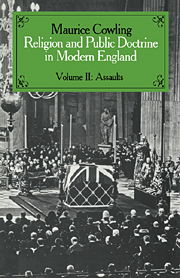Book contents
- Frontmatter
- Foreword
- Contents
- Projected contents of Volume III (for publication c. 1988–90)
- INTRODUCTION
- I THE ASSAULT ON THE EIGHTEENTH CENTURY
- II THE ASSAULT ON CHRISTIANITY
- III THE ASSAULT ON CHRISTIANITY IN THE TWENTIETH CENTURY
- IV ASSAULTS ON THE ASSAILANTS
- CONCLUSION: ASSAULTS AND ACCOMMODATIONS
- Notes
- Index of main names
- Frontmatter
- Foreword
- Contents
- Projected contents of Volume III (for publication c. 1988–90)
- INTRODUCTION
- I THE ASSAULT ON THE EIGHTEENTH CENTURY
- II THE ASSAULT ON CHRISTIANITY
- III THE ASSAULT ON CHRISTIANITY IN THE TWENTIETH CENTURY
- IV ASSAULTS ON THE ASSAILANTS
- CONCLUSION: ASSAULTS AND ACCOMMODATIONS
- Notes
- Index of main names
Summary
In Religion and Public Doctrine Volume I the author presented himself as the creation, or victim, of an intellectual experience. Volume I was not, however, an autobiography. What it did was extract from the experience it described prescriptive guidance about the ways in which England and the history of English thought should be understood.
From now on the author will evaporate. The rest of the work will display the assumptions that were displayed in Volume I but with a detachment which was absent there. In Volumes II and III the author will neither breathe down his own neck nor breathe down the reader's; here, so far as he can, he will deal with the past-as-it-was.
The past-as-it-was is an artifice, an irrecoverable entity which has little value except as illusion. The past-as-it-was is so intimately connected with the historian's mentality and reflects so much what the historian means that it ought theoretically to be avoided. In practice, of course, it cannot be avoided and nor is it avoided here. Pasts have to be displayed, and the past that is displayed here is a past whose leading feature is the erosion of English Christianity.
In England the erosion of Christianity has been irregular and has been closely connected with the revival of religion, beginning with the revivals of Christianity which were effected by Methodism, Evangelicalism and Tractarianism, continuing through the revivals of religion which were effected by Christianity's assailants, and being halted only when higher education, culture, science and respectability established an institutionalized neutrality between four conflicting attitudes in the twentieth century. Each of these attitudes has been an attitude to Christianity.
- Type
- Chapter
- Information
- Religion and Public Doctrine in Modern England , pp. xi - xxviiiPublisher: Cambridge University PressPrint publication year: 1985

